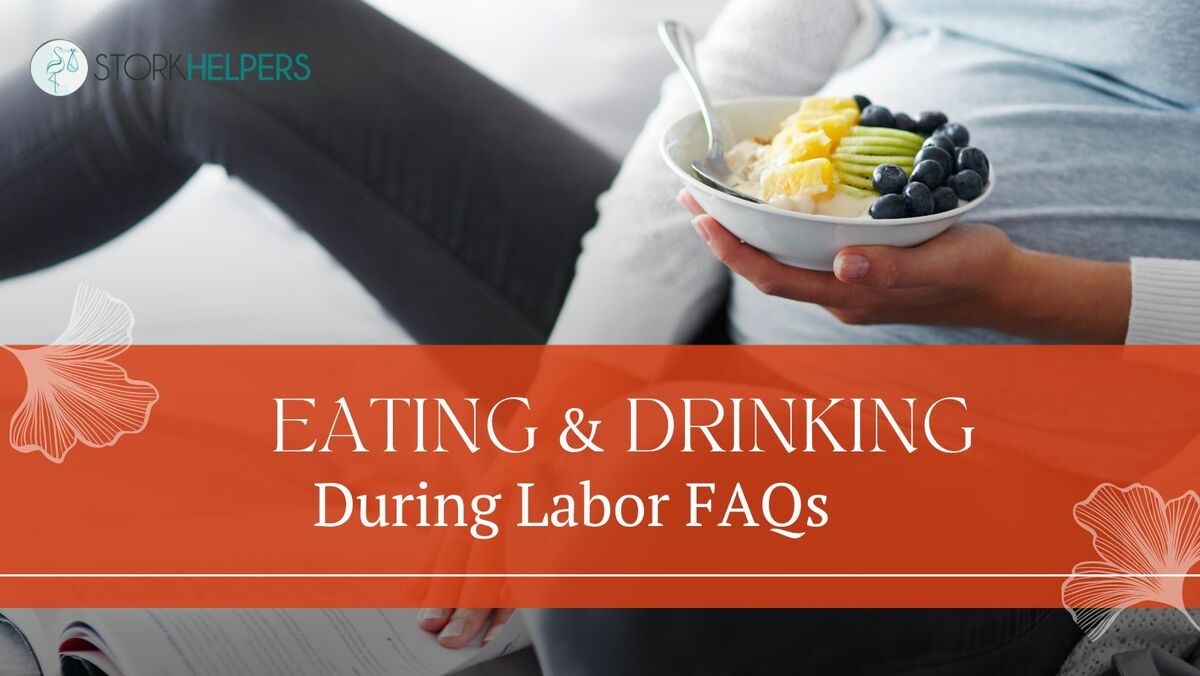Eating & Drinking During Labor FAQs

Labor is hard enough, the last thing a mama should have to worry about when giving birth to her baby is an empty stomach.
You may have heard that mamas should not ever eat or drink while giving birth, but this rule is simply not true.
Many mamas eat and drink while giving birth. The caloric expenditure of a woman birthing a baby is thought to be similar to that of a marathon runner, so many women need sustenance during their labor, or their bodies will begin burning fat for energy.
There is insufficient research on nutritional needs during labor, but research in sports nutrition has found that ingesting carbohydrates during intense exercise improves performance and protects against fatigue and ketosis.
Every mama is different. Some will want to eat during labor and others will not. The choice is yours!
In this post, we will go over some frequently asked questions about eating and drinking during labor so you can be informed before you give birth. Keep reading to learn more!
Common Questions About Eating and Drinking During Birth
Eating and drinking during labor have become increasingly common in recent years.
However, many people have doubts.
Let’s put the myths to rest, here are some of the most common questions regarding eating and drinking during labor.
Why Would I Want to Eat or Drink During Labor?
During labor, you are going to burn calories. A lot of calories.
The uterus is made out of mostly muscle. During labor that muscle is working overtime and it needs energy and water to keep it going. If your body does not have enough energy at its disposal during labor, it will break down your body’s fat supply to get more. This can lead to exhaustion, making your labor even harder than it should be.
Add dehydration to the mix and you have an unfavorable situation for both mama and baby.
A light meal or your favorite foods can give your body the boost of energy it needs to finish your labor strong and ultimately make the immediate recovery easier.
Why Would Anyone Advise That I Not Eat During Labor?
In the US, hospitals use something called an NPO ('nil per os' in Latin) policy for women in labor. This policy is often called a "Nothing by Mouth" policy and it was first implemented in the 1940s when two practices that are not used today were very common.
Those two practices are:
- Twilight sleep
- Inhaled anesthetics
Either of these practices put the laboring mama into a sedated state and if she had a full stomach, she was prone to vomiting and aspiration. At this time, since anesthesia was much more dangerous, an NPO policy was necessary. However modern practices have made sedation (which is very rare during pregnancy) much safer.
Is There Still a Risk of Aspiration During Pregnancy?
During surgery, things can always go wrong. If there are problems during pregnancy and you need a caesarian section, then you will have to go into surgery.
A 2011 study looked at births between 1991 and 2002 and found that anesthesia was used in 14% of births in this period.
However, multiple studies have been done about the risk of death or illness from aspiration during anesthesia during pregnancy and the result is that it is exceedingly rare. Since it is emergency surgery, doctors should remove food from the stomach before surgery begins if they suspect you have a full stomach.
In short, some doctors say that since every woman going into labor has a chance of needing anesthesia, every woman should be NPO. However, the cases where a woman died as a result of aspiration from anesthesia were completely preventable and proper airway protection was not provided.
Today, only a small percentage of caesarians require general anesthesia, and when they do, failed airway management is rare.
Is There Still a Risk of Aspiration During Labor?
A 2011 study examined cesarean births between 1991 and 2002 and found that 86 pregnancy related deaths were associated with complications of anesthesia, or 1.6% of total pregnancy-related deaths. In addition, multiple studies have been done about the risk of death or illness from aspiration during anesthesia during labor, and the result is that it is exceedingly rare.
In short, some doctors say that since every woman going into labor has a chance of needing anesthesia, every woman should be NPO. However, the cases where a woman died as a result of aspiration from anesthesia were completely preventable and proper airway protection was not provided. Today, only a small percentage of caesarians require general anesthesia, and when they do, failed airway management is rare.
Read More About Eating and Drinking During Labor Here.
Stork Helpers is Here for You at Every Step of Your Birth Journey
Many women wonder if they should eat and drink during labor. There is no conclusive answer, but multiple studies have shown that it is not dangerous to eat and drink while giving birth.
Check out this guide from Dr. Rebecca Dekker.
Ultimately the decision comes down to each individual and what they need during their labor.
If you are looking for a doula that will always listen and support you, then Stork Helpers is here for you.
We currently provide birth doula support, placenta encapsulation, and childbirth education to help you have the pregnancy and labor you need.
For doula and childbirth support in Cincinnati, Dayton, and Northern Kentucky, reach out to Stork Helpers today!

